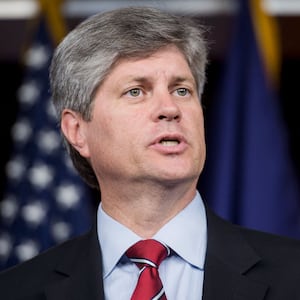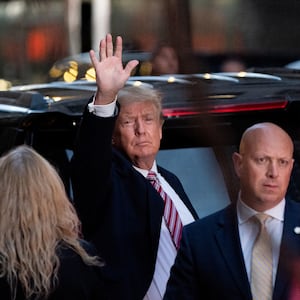There are tapes.
That’s the news from a recent filing in federal court in the case against indicted Rep. Jeff Fortenberry (R-NE), whose defense team acknowledged that the government made at least two recordings of the sitting congressman over the course of its investigation surrounding illicit campaign contributions from a Nigerian-Lebanese billionaire.
But the tapes led Fortenberry’s lawyers to ask the judge for what some legal experts say is essentially a courtroom pipe dream.
On Nov. 9, Fortenberry’s legal team moved to disqualify the assistant U.S. attorney in charge of the prosecution, arguing that his involvement in the lead-up investigation makes him a witness and may unfairly influence the jury.
Prosecutors, on the other hand, believe the recordings will help prove their central allegation that Fortenberry deceived investigators about his knowledge of the source of $30,000 that a foreign national illegally contributed to his 2016 campaign.
What’s more, the tapes are just a fraction of the government’s evidence against the nine-term congressman.

Rep. Jeff Fortenberry appears in court after he was indicted on federal charges last month.
Mona Edwards/ReutersThe prosecution said in a filing that the recordings in question—a 2018 conversation with a government informant, and a 2019 interview with an agent in Fortenberry’s Nebraska home—are only two among more than 50 audio and video recordings they have turned over to the defense team. And those dozens of recordings are supplemented by more than 11,600 pages of “written communications, reports, transcripts, articles, and other records,” the federal attorneys said.
The banquet of evidence so overwhelmed the defense team that the prosecution asked the judge on Nov. 9 to delay the trial.
And that was the day Fortenberry’s counsel made their move. They filed a motion asking the court to replace AUSA Mack Jenkins, who had helmed the probe into the congressman and now leads the prosecution against him.
The gist of the defense team’s argument is that Jenkins is compromised because his involvement at various stages of the investigation qualifies him as a material witness.
Jenkins, they say, was the person who secured the initial warrants to record the sitting congressman—a fact which Fortenberry’s attorneys acknowledge would have required “written approval from the highest levels” of the DOJ.
Then, they say, Jenkins, “armed” with those tapes, interviewed Fortenberry with other agents in Washington, D.C., and concluded that the congressman’s denials were lies.
The defense claims this should disqualify Jenkins.
If he presented this evidence to a jury, they argue, the AUSA might be perceived as advocating on behalf of the unnamed government witness, which would be improper for a prosecutor and could threaten the sanctity of juror impartiality.
“Here, merely by presenting evidence or argument related to the Washington, D.C., statements, AUSA Jenkins would be vouching personally for Count Three’s central allegation: that Congressman Fortenberry lied to AUSA Jenkins personally,” the attorneys wrote. This fact, they said, would make it “near-impossible” for jurors to distinguish between Jenkins’ secular role as a prosecutor and “his own personal belief and observations, that Congressman Fortenberry lied to him.”
But then the defense broke still more news. Their filing noted that the defense had warned prosecutors they would move to disqualify Jenkins “months before the indictment.” This indicates that Fortenberry, who scooped his own arrest last month in a homemade YouTube video, had been anticipating these charges for quite some time.
Miriam Baer, former assistant U.S. attorney in the Southern District of New York and now a professor at Brooklyn Law School, dismissed the argument, saying that Jenkins’ dual roles are “quite common,” and that a ruling in Fortenberry’s favor would have “profound implications” for federal law enforcement across the board.
“It’s true that prosecutors cannot vouch for their witnesses’ integrity. Trial courts take that rule seriously because prosecutorial vouching impedes the jury’s fact-finding role,” Baer told The Daily Beast. “But the argument sounds overly broad.”
She explained that if courts found that, merely by supervising an investigation, an AUSA indirectly “vouches” for the witnesses later called to testify at a trial, the decision would have “profound implications for US Attorneys offices, where it is quite common for prosecutors to begin working on a case from the relative early stages of an investigation.”
“It seems far more likely that a judge would monitor testimony carefully for any signs of vouching and instruct the jury if necessary,” Baer said.
Her analysis rings true with Jason Mehta, a former AUSA for the Middle District of Florida, who said that, while such requests are “not unprecedented,” they are only granted in “the most unusual” instances.
“The federal criminal justice system envisions an active role for law enforcement agents and prosecutors. And, in the presence of law enforcement agents, federal prosecutors are often involved with questioning of witnesses or defendants,” Mehta explained. “Seeking the recusal of a prosecutor for his or her involvement in a case is not unprecedented, although it is a rarely granted motion except in the most unusual of circumstances.”

Rep. Jeff Fortenberry shakes hands with Ben Affleck after the actor testified on the Democratic Republic of Congo before the House Foreign Affairs Committee's Africa, Global Health and Human Rights Subcommittee in 2011.
Saul Loeb/GettyMehta, who now defends clients against DOJ prosecution, added that even if the move is unlikely to succeed, defense teams sometimes take the risk because it is “a powerful threat.” Federal prosecutions, he observed, are often “very individual-specific,” and can hang on the actions of agents and prosecutors in the investigation.
Former federal prosecutor Barb McQuade agreed that it was “not uncommon” for a prosecutor to interview a prospective defendant in the investigatory stage, especially when, as in the case, the prosecutor is accompanied by federal agents.
In this case, McQuade said, it would be “improper” for Fortenberry to call the prosecutor to testify, because—as the defense team itself points out—his opinion is immaterial to a jury. At the same time, she noted, Fortenberry still has the right to call Jenkins if he wants, since Jenkins would likely have “first-hand information as a fact witness.” The defense’s motion claims that Fortenberry “plans to do so,” but it is unclear whether this is an empty threat, or if he will follow through.
Still, the possibility was enough for McQuade to conclude that Jenkins “should agree to withdraw from the case.” The matter could then be assigned to another prosecutor, she said, leaving Jenkins available to testify if called.
Fortenberry was indicted last month in the U.S. District Court for the Central District of California on three felony counts of lying to the FBI. A DOJ press release announcing the charges alleged that he had “knowingly and willfully falsified, concealed, and covered up by trick, scheme, and device material facts” regarding $30,000 in foreign contributions funneled to his campaign through straw donors at a 2016 event in Los Angeles.
The foreign donor, Gilbert Chagoury—a billionaire industrialist and philanthropist and one of the wealthiest people in Africa—entered into a deferred prosecution agreement in 2019 after admitting he gave a total $180,000 to several different political campaigns, including $30,000 to Fortenberry.

It is illegal for foreign nationals to contribute to candidates for office, and it is illegal for candidates to solicit and accept such donations.
Fortenberry denies wrongdoing. Although he now acknowledges the money came from Chagoury, Fortenberry maintains he did not know the source at the time. (He only offloaded the money after his interviews with the feds.)
Notably, the government didn’t charge him with that crime. Instead, the indictment cites a cover-up, charges which hinge largely on a 2018 phone call from an unidentified “Individual H,” who told the congressman that the $30,000 “probably did come from Gilbert Chagoury because he was so grateful for your support [for] the cause,” according to the indictment.
“Individual H,” however, was an undercover informant, and he recorded the call on behalf of the government, according to all parties involved.
In 2019, Fortenberry was recorded again, this time by an FBI agent in an interview at the congressman’s Nebraska home. Prosecutors say the content of those two tapes contradicts Fortenberry’s other statements and actions, indicating he lied and intentionally attempted to deceive the government.
Fortenberry has since agreed to a restrictive protective order that requires his defense attorneys to accompany him whenever he reviews evidence in the case, going so far as to bar him from ever being left alone with it.
On Nov. 15, the judge pushed the trial back from December to February. The charges each carry a maximum three years in prison. A broader investigation into “other public officials” is ongoing.
A Fortenberry spokesperson did not reply to a request for comment.







